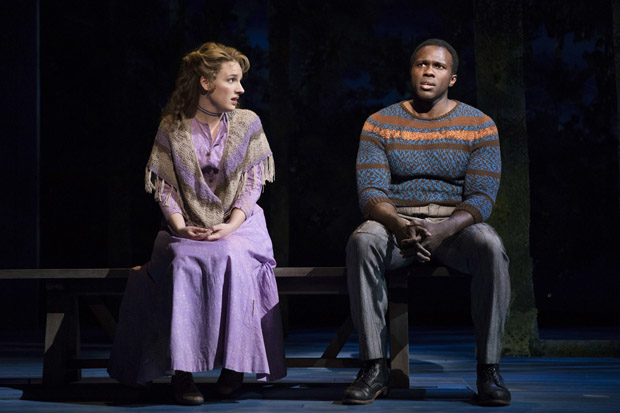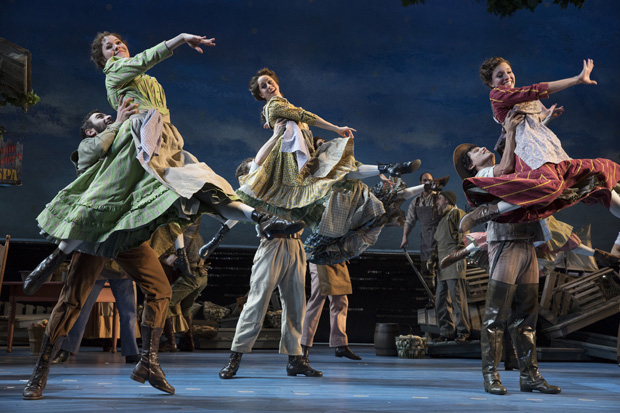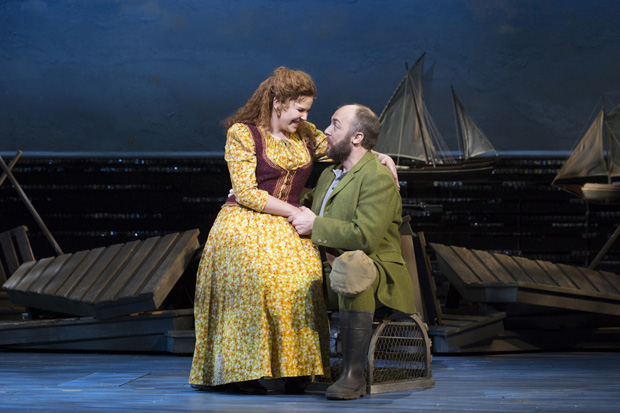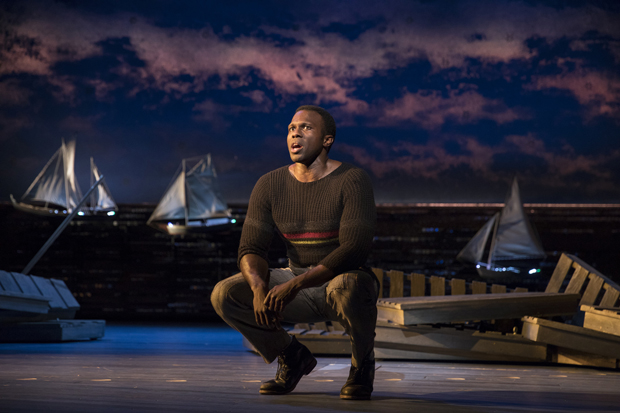Broadway Takes Another Spin Around Rodgers and Hammerstein's Carousel

(© Julieta Cervantes)
Carousel as a musical property is dangling on a precarious threshold. Julie Jordan, the hopelessly devoted wife of abusive carousel barker Billy Bigelow, has grown in controversy since her last turn on Broadway in the Tony-winning 1994 revival, and director Jack O'Brien has taken up the weighty task of proving that Carousel — which opens this evening at the Imperial Theatre — still has a place on a Broadway stage amidst the firestorm of movements like #MeToo and #TimesUp. The prospect feels like a 100mph fastball that has equal chances of a tragic whiff or a triumphant grand slam. After all, a reinterpreted Carousel that successfully speaks to the themes of 2018 has the potential to be the most thrilling theatrical event of the season. But while O'Brien's production is both a feast for the eyes and ears, you can't help but feel that the effort as a whole amounts to a nervous bunt.
In certain respects, O'Brien's production offers everything you want out of a performance of Carousel. Santo Loquasto's striking scenic design straddles heaven and earth with a stunning starscape and a carousel centerpiece that majestically descends from the sky (Ann Roth's costumes and Brian MacDevitt's lighting both complement the small-town-by-the-sea atmosphere); Justin Peck offers heart-stopping choreography for the musical's wordless overture and famous second-act dream ballet (gorgeously performed by Brittany Pollack and Andrei Chagas); Renée Fleming's Nettie Fowler brings us to the opera with her sonorous rendition of "You'll Never Walk Alone"; and costars Jessie Mueller and Joshua Henry sing the Rodgers and Hammerstein score to beyond its fullest potential (Henry's "Soliloquy" is the stuff of magic). Aesthetically, complaints are few. Dramatically, however, they start to pile up as soon as Billy leans seductively against Julie's wooden horse.

(© Julieta Cervantes)
Following this flirtatious encounter at the town carousel, Julie and her best friend Carrie Pipperidge (Lindsay Mendez) are thrown out by the carousel's jealous owner, Mrs. Mullin (Margaret Colin with a sharp-tongued cameo). Enter Billy Bigelow, the larger-than-life barker who takes Julie's side and gets fired in the process. Julie sacrifices her job in return, opting to stay with Billy past her curfew and sending Carrie on her way after she proclaims herself taken by a yet-unseen Mr. Snow (Mendez delightfully milking the song "Mister Snow" for every drop of comedy, as she does for the rest of her scene-stealing appearances).
Billy betrays his biggest flaws in this first meeting, threatening Mrs. Mullin with "a smack on the jaw" and intimidating Carrie and Julie with demands to display their money. And yet, by the end of the famous bench scene, in which Julie and Billy coyly share the hypothetical love song "If I Loved You," we need at least a glimpse of the lamb that Julie sees trapped inside Billy's projected lion. When Henry's version of Billy turns out to be lion through and through, it's difficult to find the empathy for either half of this romantic equation — especially after another poor choice lands Billy at the back door of heaven (John Douglas Thompson greets him amiably as the show's omniscient Starkeeper).
Despite a voice that will make you swoon, Henry trades in all of Billy's pompous charm for short-tempered belligerence. Instead of a quiet, unpredictable stewing of emotions, the character's inner turmoil is explosively expelled, leaving nothing to draw us closer to the heat. This only puts Julie at a disadvantage as she defends her relationship, which, she soon confesses to Carrie, has turned physically violent (Alexander Gemignani becomes Billy's delightfully idiosyncratic converse as the patronizing yet gentle Mr. Snow).

(© Julieta Cervantes)
Mueller lends an inherent strength to all of her performances — whether she's being jerked around by a drug-addicted husband as Carole King in Beautiful or held captive by an abusive one as Jenna in Waitress. You feel that same inner spark from her Julie, but O'Brien's production — be it his direction or the many cuts he's made to the book and score —never gives Mueller enough oxygen to fan her character's spark into a flame. One of her most notably missing lines comes in Act 2, when, talking to her now-15-year-old daughter Louise (Pollack), she says, "It is possible, dear, for someone to hit you — hit you hard — and not hurt at all." It's a line that should make modern audiences cringe, but with Billy dominating the narrative, it's more of a disservice to Julie's agency to bury her perspective than to let her voice it. It may be misguided, but the only thing worse than a woman verbally legitimizing abuse is a woman silently accepting it.
A similar silence spills into the portrayal of Billy Bigelow — a character shaped by the oppression of a classist system, but whose depiction ignores the parallel issue of race while an African-American actor has the rare opportunity to tackle the role. When it comes to Carousel, the temptation to tread softly is likely a strong one. But if we're going to put a Rodgers and Hammerstein classic before "the highest judge of all," it's going to need a better defense .

(© Julieta Cervantes)










